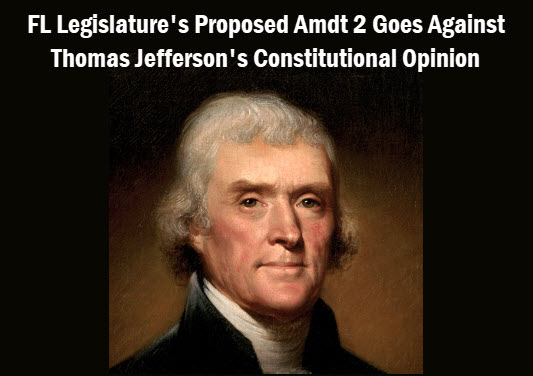Florida Legislature’s Proposed Amendment 2 Should be Rejected
October 24, 2022 12:40 pm

Painting: Rembrant Peale |
Columbia County Observer graphic
On Election Day voters are being asked to decide whether to abolish one of Florida’s important ways citizens can directly have their voices heard. If passed by 60 percent of Florida’s voters, Amendment 2 would abolish the Constitution Revision Commission (CRC).
The CRC is a board of citizens appointed by the governor, legislative leaders, and the Supreme Court chief justice. The CRC meets every twenty years to review the state’s constitution and makes recommendations for change.
As one of the only states with a CRC, Florida gives its citizens a rare and innovative opportunity to play an active role in democracy.
Enshrined in the state constitution, the 37-member CRC travels the state to hear about the issues that matter most to Floridians and proposes constitutional amendments that go right to the ballot for a vote. Since 1968, the CRC has convened only three times, most recently in 2017-18.
The third CRC met and placed seven amendments on the ballot on issues ranging from ethics to dog racing and offshore drilling to crime victims' rights. The courts removed the eighth amendment for a misleading title. All the amendments passed.
Why is the Legislature trying to eliminate the empowerment of Florida’s citizens by abolishing the Charter Review Commission? Answer: to silence Florida’s citizens.
The argument is that several of the previous measures contained more than one item, called ‘bundling,’ and was confusing. But apparently, voters disagreed. More telling is that the Legislature does not like having another entity that can put constitutional changes on the ballot. This view is consistent with recent legislative measures to curb the use of the initiative process, which is a second way citizens can directly address issues that the Legislature wants to avoid.
The initiative process and the CRC were placed in the 1968 constitution to respond to frustration that there was no practical way around a legislature entrenched against reform.
Reforms flowing from the first two CRCs included requiring the state to make adequate provision for an efficient, safe, secure, and high-quality public education system, a local option for merit selection of trial judges, streamlining the state cabinet to four officials (including the governor) and setting up a system of public financing for statewide candidates.
A 2019 LeRoy Collins Institute survey found that Floridians like having a body other than the Legislature listen to the people and propose updates to the state’s constitution. While few recognize the CRC by name, an overwhelming majority – 87% – favor having a commission doing what the Charter Review Commission does.
The LeRoy Collins Institute has long supported the CRC and continues to do so. The CRC follows the advice of Thomas Jefferson, who thought that every generation should have the 'solemn' opportunity to update its constitution.
This opportunity should not be revoked: Vote “No” on Amendment 2.
-----
Carol Weissert, Ph.D, is Professor Emeritus at FSU, where she was the LeRoy Collins Eminent Scholar and Professor of Political Science from 2003-2021. She is a fellow of the National Academy of Public Administration and was the Fulbright Distinguished Chair in American Political Science in Australia in 2016. Ms. Weissert earned her doctorate in political science from the University of North Carolina at Chapel Hill.

 By
Carol Weissert
By
Carol Weissert